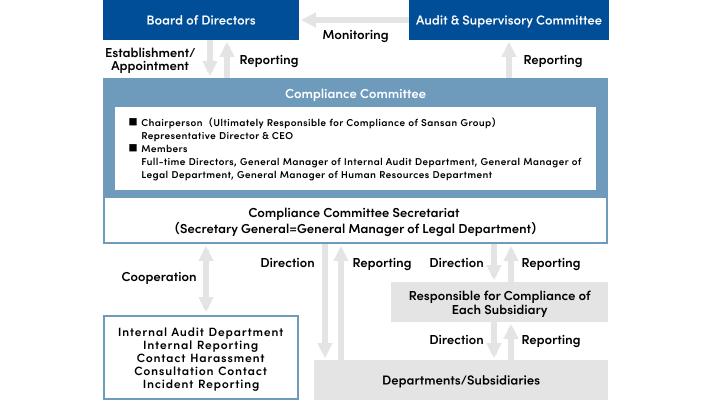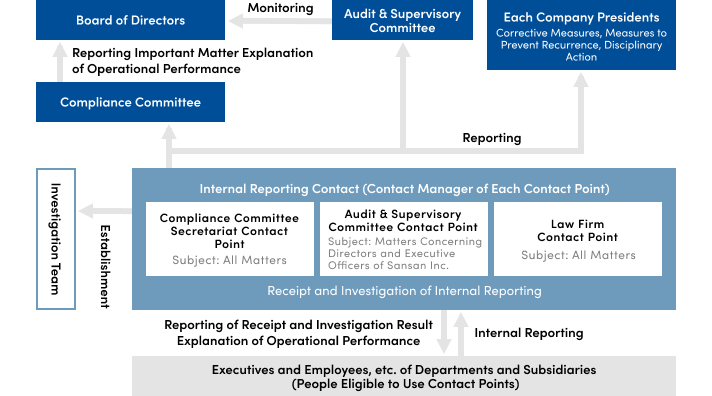Compliance

Basic Concept
In line with our philosophy, our basic policy calls for all officers and employees to not only comply with laws and regulations, but also to conduct appropriate corporate activities based on high ethical standards. We believe it is essential to develop our business fairly and responsibly, using the added value we generate as a source of competitiveness. Based on this approach, we have identified “ensure compliance” as one of our material issues to prioritize. In line with this, we work to strengthen a management structure to support rapid business growth through various measures.
Compliance Structure
Establishing Compliance Committee
In line with our Compliance Regulations, which stipulate basic matters related to compliance, we have established a Compliance Committee. The Committee is chaired by the Representative Director who also has ultimate responsibility for compliance. It comprises full-time directors and the heads of the Internal Auditing Department, Legal Department, and Human Resources Division. The Compliance Committee oversees the Group’s compliance by, for example, formulating related policies and measures and providing overall compliance monitoring. Specifically, we have designed a program that integrates the structure and systems aimed at promoting compliance, and we operate it based on the PDCA cycle. In addition, a system is in place for any compliance violations occurring in each group company to be reported to the Compliance Committee Secretariat. The Committee meets twice a year, and also as needed in the event of misconduct or other irregularities.

Major Initiatives
Establishing, Promoting, and Disclosing Our Compliance Basic Policy
We have established the Compliance Basic Policy as a guideline for officers and employees, documenting our Group’s basic approach to compliance, and its content has been approved by the Board of Directors. The Compliance Basic Policy is communicated through internal information sharing tools and training. It has also been disclosed to all stakeholders through our website.
Compliance Basic PolicyInternal Reporting System
Establishing Internal Reporting Contacts
We have established internal reporting system regulations under the internal reporting system and are operating the regulations for promptly assessing and dealing with information on legal violations or potential violations of laws and regulations.
We have also established internal reporting contacts available to all our officers and employees (including contract, temporary, and part-time employees, and those working under contract or other agreements) and former employees. There are three contact points: an internal contact handled by the Compliance Committee Secretariat, an external contact outsourced to a law firm, and an external contact which is composed entirely of outside directors who are Audit & Supervisory Committee members. The external contacts are also fully independent from the company.
We inform all our officers and employees of details of the internal reporting system and contact points through training on joining the company, compliance training, internal information sharing tools, etc. Please see ESG Data for the training initiatives taken by the Company. In addition to the Internal Reporting Contacts, a harassment consultation contact has been established and is managed by the Human Resources Division.

Receipt, Investigation, and Handling of Internal Reporting
Whistleblowers can make anonymous reports by email, using a dedicated form, or by postal mail to each internal reporting contact. After receiving the report, the contact will report to the Compliance Committee and the Audit & Supervisory Committee and conduct a fair and impartial investigation. If illegal activities are uncovered, necessary corrective and recurrence prevention measures will be implemented and violators will be punished in accordance with the provisions of the work regulations.
Protection of Whistleblowers
Each internal reporting contact receives anonymous reports in accordance with the internal reporting system regulations. In addition, we designate contact persons and those in charge of investigations, and stipulate confidentiality obligations to ensure the management of information that identifies whistleblowers and the content of reports, thereby protecting the whistleblowers.
In addition, the internal reporting system regulations prohibit any dismissal, disciplinary action, demotion, salary reduction, disadvantageous reassignment, relocation, or transfer, encouragement to retire, or any other retaliatory acts or disadvantageous treatment of whistleblowers. The regulations stipulate that if retaliatory acts or advantageous treatment is found against whistleblowers, relief and restorative measures will be taken and violators will be punished in accordance with the work regulations and zero-tolerance policy.
How the Internal Reporting System Works
Please see ESG Data for the number of whistleblowing reports to the Internal Reporting Contacts.
The Compliance Committee, the Audit & Supervisory Committee, and Board of Directors receive reports on the content of each report and the investigation results, and monitor and supervise how the internal reporting system works.
Addressing the Prevention of Bribery and Corruption
Establishing Behavioral Guidelines
We believe raising awareness of corruption, including bribery, is vital to our accelerated business development in Japan and overseas. In response, we have established basic anti-corruption and anti-bribery principles and specific behavioral guidelines. Moreover, to further reinforce ethical conduct and attitudes, we will use our code of conduct to do our utmost to prevent prevent all forms of corruption-related acts including bribery by not tolerating any acts that violate national and international anti-corruption and anti-bribery laws including Japanese Penal Code and Unfair Competition Prevention Act, U.S. Foreign Corrupt Practice Act, and UK Bribery Act.
Initiatives to Prevent Corruption
We have established the basic policy regarding prevention of bribery and corruption and the Bribery and Corruption Prevention Regulations, which we make known to our employees along with the operational guidelines on entertainment, meals, or gifts. In addition, we provide employee training to deepen their understanding of the policy, the regulations, and the guidelines. Please see ESG Data for the training initiatives taken by the Company.
Based on the countries and regions where we operate, our business activities, our business partners, and the results of compliance training questionnaires, the Compliance Committee Secretariat compiles corruption risks and the Compliance Committee evaluates them. In order to prevent the provision of cash or other benefits to a public servant or person with equivalent status (hereinafter referred to as “public servant”) with the intention of influencing his/her service acts regardless of whether in Japan or abroad, the Compliance Committee Secretariat monitors the approval process for entertainment, meals or gifts provided to public servants by our officers and employees. In addition, we keep accurate and appropriate record of approval process and accounting ledgers, etc. regarding all transactions and dispositions of assets to ensure compliance with the basic policy regarding prevention of bribery and corruption and the Bribery and Corruption Prevention Regulations.
If any violations of this Basic Policy or related regulations are identified through audits or other means, corrective actions and measures to prevent recurrence will be taken immediately, and the matter will be handled in accordance with our zero-tolerance policy.
Consulting/Reporting Contacts for Officers or Employees
We have set up internal reporting contacts to consult and report bribery and corruption within our group. Please see the Internal Reporting System above for the details and operation status of the internal reporting contacts.
There were no cases of significant compliance violations or legal actions taken by the authorities regarding bribery and corruption during FY2025.
Addressing Antisocial Forces
Our policy against antisocial forces and groups (such as organized crime groups, members or quasi-members of organized crime groups, companies affiliated with organized crime groups, corporate racketeers, a rogue adopting social movements as its slogan, and crime groups specialized in intellectual crimes) that threaten social order and safety is defined in our Basic Policy against Antisocial Forces. We fully recognize the importance of cutting all ties with antisocial forces from the perspective of social responsibility, compliance, and corporate defense, and all our officers and employees will strive to ensure the appropriateness of and safety in our duties by complying with this Basic Policy.
Conducting Internal Audits
We have established an Internal Audit Department that reports directly to the Representative Director and conducts internal audits in a planned and systematic manner. The Internal Audit Department consists of one Head of Internal Audit and one staff member. Internal audits are carried out by the Head of Internal Audit, the staff member, and other internal auditors appointed by the Head of Internal Audit, operating under the structure outlined below.
Our internal audits examine the status of compliance with laws, the Articles of Incorporation, and internal regulations within our business activities; the establishment and operation of our compliance framework; the rationality and effectiveness of business operations in achieving our management objectives; and the status of asset management and preservation. In addition, the audits aim to assess and evaluate the effectiveness of internal controls implemented and operated across our Group, identify areas for improvement, and provide advice on how to address them.
All business locations, departments, and domestic and international subsidiaries are subject to internal audit. We create audit plans to ensure that each target is audited at least once every three years. Furthermore, we conduct annual audits for operations required to obtain or maintain business licenses and certifications, such as international standards.
The Internal Audit Department prepares an annual audit plan in collaboration with the Audit & Supervisory Committee and conducts audits upon receiving approval from the Representative Director. Audit results are compiled monthly and reported to both the Representative Director and the Audit & Supervisory Committee. For matters requiring improvement, corrective instructions are issued to the relevant departments. The status of those improvements is monitored and reported again to the Representative Director and the Audit & Supervisory Committee. Additionally, a summary report of audit results is submitted to the Board of Directors once a year.
The Internal Audit Department also collaborates with the Audit & Supervisory Committee and the accounting auditor to ensure the effective sharing of information required for audit purposes.
Conducting of Various Types of Training
We ensure that officers and employees of the Group undertake training on preventing workplace harassment and correctly understand factors causing harassment, such as abuse of one’s position of power and lack of awareness of power dynamics and inadequate understanding and knowledge about different values, as well as specific ways to prevent harassment.
As part of our compliance training, we regularly provide role-specific sessions covering the importance of legal compliance, information protection, respect for human rights, fair business practices, appropriate use of company assets, bribery prevention, insider trading prevention, and our internal reporting system. These efforts are designed to enhance both awareness and knowledge of compliance among all officers and employees. Please see ESG Data for an overview of the various training initiatives taken by the Company.
As a goal for the fiscal year ending May 2030, we have set a target of achieving a 100% participation in compliance-related training.